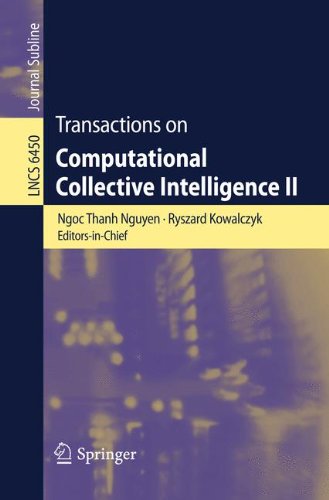

Most ebook files are in PDF format, so you can easily read them using various software such as Foxit Reader or directly on the Google Chrome browser.
Some ebook files are released by publishers in other formats such as .awz, .mobi, .epub, .fb2, etc. You may need to install specific software to read these formats on mobile/PC, such as Calibre.
Please read the tutorial at this link: https://ebookbell.com/faq
We offer FREE conversion to the popular formats you request; however, this may take some time. Therefore, right after payment, please email us, and we will try to provide the service as quickly as possible.
For some exceptional file formats or broken links (if any), please refrain from opening any disputes. Instead, email us first, and we will try to assist within a maximum of 6 hours.
EbookBell Team

5.0
28 reviewsWelcome to the second volume of Transactions on Computational Collective Intel- gence (TCCI), a new journal devoted to research in computer-based methods of c- putational collective intelligence (CCI) and their applications in a wide range of fields such as the Semantic Web, social networks and multi-agent systems. TCCI strives to cover new methodological, theoretical and practical aspects of CCI understood as the form of intelligence that emerges from the collaboration and competition of many individuals (artificial and/or natural). The application of multiple computational int- ligence technologies such as fuzzy systems, evolutionary computation, neural s- tems, consensus theory, etc. , aims to support human and other collective intelligence and to create new forms of CCI in natural and/or artificial systems. TCCI is a double-blind refereed and authoritative reference dealing with the wo- ing potential of CCI methodologies and applications, as well as emerging issues of interest to academics and practitioners. This second issue contains a collection of 10 articles selected from high-quality submissions addressing advances in the foun- tions and applications of computational collective intelligence. In “Integration P- posal for Description Logic and Attributive Logic – Towards Semantic Web Rules” G. Nalepa and W. Furmanska propose a transition from attributive logic to description logic in order to improve the design of Semantic Web rules. K. Thorisson et al.